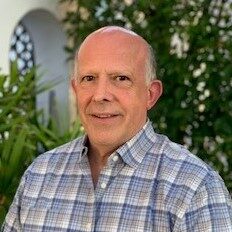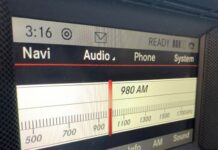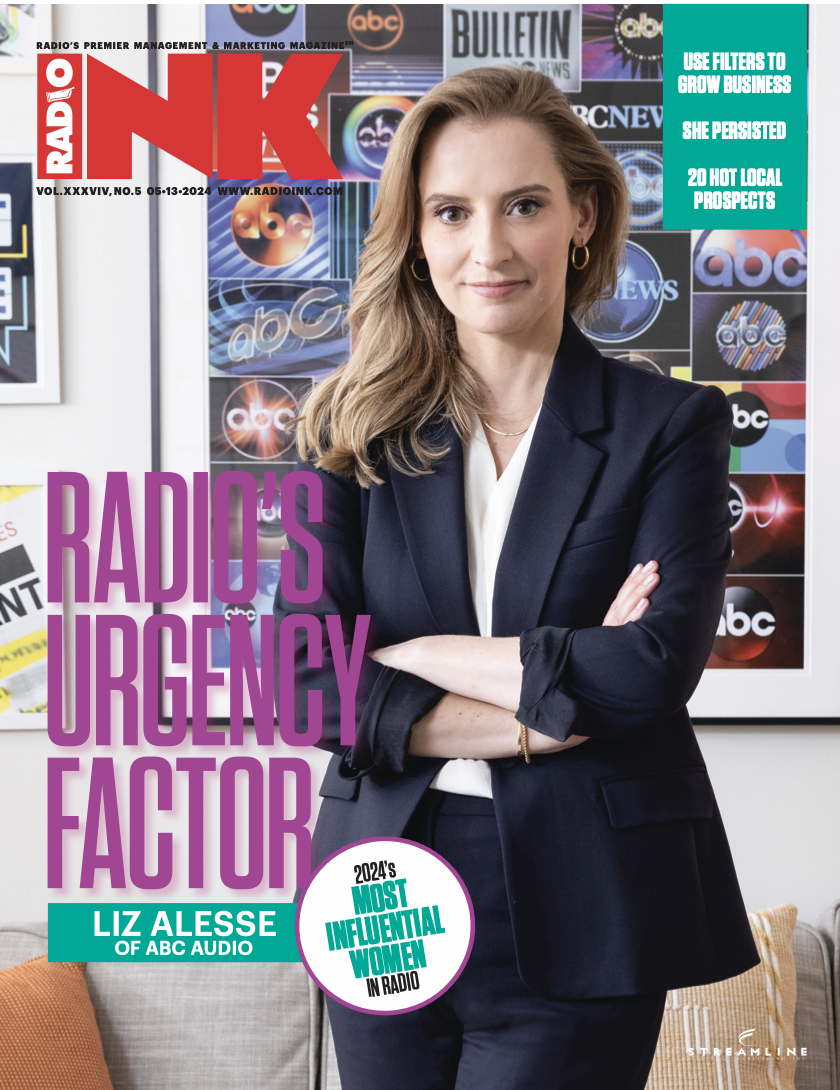
(By Drew Hayes) It couldn’t be a simpler concept: make AM more relevant, interesting, competitive—and in demand—like the podcasts that have gained so much share of ear (and revenue) from audio listeners.
We have spent a lot of time figuring out how to get AM onto FM signals and rightly explaining to listeners how to hear programs via Alexa, Siri, and the many digital platforms. What we haven’t done is really scrutinize and improve the most fundamental element: what comes out of the speakers.
Since the Supreme’s 1978 ruling in FCC vs. Pacifica on broadcasting “the seven dirty words”—which pretty much no one hasn’t heard and/or said—the FCC has been radio’s “Word Warden.”
In 1978, FM was just becoming a force and the Internet was something Mork might have had on the planet Ork. According to Gary Begin in Radio Ink, in 1970, only 10% of Americans cumed the FM band. By 1978, 50% of all radio listening moved to FM. In 1983, FM became the standard issue in all US-built cars. Forty years later, we have to lobby politicians to twist the arms of car companies to keep AM on the road.
The best way to keep AM radios in cars and, even more importantly, to keep listeners coming to our broadcast mall, is to have what is being offered be IN DEMAND. We have done little to evolve the programming heard on the AM band… rather, we have homogenized it. There is no music on AM now and sports play-by-play, which used to be heard exclusively on AM, is now available on a multitude of platforms. AM must offer programs that are vibrant, engaging, and relevant to listeners.
It’s a silly, irrelevant canard to have to “protect the kids” from language they hear on podcasts, see on cable, and of course use in their day-to-day activities. Always the kids! No kids are listening to AM radio. That’s part of the problem. That even their parents aren’t listening to AM radio is an even bigger part of the problem, and it is up to stations and station groups to fix it.
Podcasts, streaming, and cable talent have the latitude to create whatever program themes and topics they want, produced with clear, descriptive, and colorful wordsmithing. They say whatever they want, whatever attracts an audience.
The FCC has no jurisdiction over podcasts, cable, or streaming – only over broadcast entities, so there is no governmental sentry at the gate of podcasts, cable, or stream to judge language and content…
As the audio medium continues to evolve, many podcasts are finding wider audiences on radio, podcast-to-broadcast, and, in preparation for air, reworking is often needed. We routinely edit material out of podcasts “for broadcast,” sometimes cutting the very flavor that makes people come to the podcasts in the first place!
Leaving the taste decisions to AM station management, and letting musical artists and talk hosts express themselves, reflects the competitive realities of the audio marketplace. A talk show host having the ability to literally call BS, when warranted, will lend authenticity and emotion, the touted hallmarks of competing, unregulated media, to the daily discussions heard on AM radio.
There’s no need to save all of radio… FM doesn’t need saving. This is not an overhaul of the rules, it’s an adjustment to give AM radio a boost in an area where programmers’ and talent’s hands are tied. If we still must protect innocent ears, the FCC could regulate AM access to FM translators based on programming, by applying FM standards for language and content.
Would Howard Stern or podcast giant Adam Carolla come back to radio if the restrictions were lifted? How many people would listen to Joe Rogan if you could push one button in your car to hear him? Here’s a concept: music on AM radio. Imagine a radio station that played the original, uncut versions of songs as the artists intended. It would be like a real-life, licensed version of a pirate radio station. What a romantic notion. This could spark a movement, like the revival of vinyl, a renaissance for music on AM radio!
Recently, Olivia Rodrigo released a new single, “Vampire,” that requires some lyric surgery to make it safe for radio. Fine. But you can find the unedited version one click away all over the internet and is there really anyone who knows her music that is going to be fooled—or saved? CeeLo Green, forget you. Isley Brothers fighting the power and Steve Miller with all the funky kicks going down in the city. Google the term ‘radio edits’. There are tons of them. It could be a whole new format unto itself, heard only on AM: Real Music, Un-cut.
We need to make listeners feel the A in AM stands for ADULT. And it will surely be more AUTHENTIC.
The FCC is responsible for making sure that broadcasters (again, NOT podcasters or cable outlets) act “in the public interest, convenience and necessity.” This proposal to broaden the language permitted on AM radio, thus making it relevant to today’s marketplace, surely complies with the FCC’s mandate, it will require a thoughtful, careful move toward deregulation. Stations, companies, and markets should decide what the limits of language will be, as is the duty of an FCC license holder.
According to Nielsen’s recently released Audio Today 2023 report, 91% of all adults hear broadcast radio monthly, a greater reach than TV or smartphones. Let’s level the playing field and give AM radio a chance to compete and grow.
As FM radio maintains the lion’s share of radio users choosing a musical genre, AM radio has a beacon of news and analysis that is hamstrung by the words we’re allowed to use. We have a right to hear and be heard—lifting those language and content restrictions will liberate the free and open exchange of opinions and ideas and become a megaphone for artistic freedom. The time is now, to s*** or get off the pot.
Drew Hayes was most recently VP/Market Manager and Program Director of KABC Radio in Los Angeles. He has programmed and managed major market News, Talk and Sports stations and the ESPN Radio Network. He began his career as a talk-show host and sportscaster, occasionally biting his tongue. He can be reached at [email protected].






Ah. such sage words of advice, from someone who has utterly destroyed every station with which he has ever been involved. WLS & WCFS Chicago (no, simulcasting WBBM All-News 780 on WCFS was NOT his idea!), and most notably KABC in L.A., which Hayes took from a perennial top-5 rated station, to literally No.40 in the L.A. Arbitron lineup. Hayes first landed the PD post at KABC strictly by sucking up to Disney execs; he ended 24 years of L.A. Dodgers play-by-play coverage, replacing that and several well-respected local hosts with any syndicated far-right wing crap he could score. Hayes was sure to be as rude and disrespectful as possible to most of KABC’s longtime talent he unceremoniously bounced out the door; I know because I witnessed it personally. And RadioInk has shown itself great disrespect by giving this sanctimonious idiot a forum to pretend to have any idea of radio programming. Drew Hayes is incapable of programming a walkie-talkie, much less any major market on-air signal.
I neglected to add, that RadioInk has also shown its readers great disrespect and patronage, in giving Drew Hayes a dais from which he could spew his drivel.
Earlier in 2023 XEWW, a 77,000 watt station from Tijuan ended its Chinese programming and while the owners seek out a new leaseholder, the station has been running various types of Rhythmic music. Early on it was just as Drew suggests – uncensored. F-bombs, C-words, B-words – there were segments of heavy duty Hip-Hop. It’s been softened somewhat but still may have an uncensored lyric or two. (“Stay” by Kid Laroi and Justin Bieber comes to mind.) I tried to bring it up to several people including market managers and programming folks in Los Angeles-but never heard of any resolution. There was a time when my cable TV program guide included the titles of movies on The Playboy Channel – uncensored. Drew’s right in the fact that we’re not protecting our kids from anything they don’t already know about. But we’ve known all along that to really succeed, your content has to be exclusive and better than your competition. That’s the only drawback to this suggestion. Of course there will be companies making a living off of their AM religious programming who will not want to see this happen, but their content is also available online. We can applaud Drew for-at least-having an idea surface that no one else has dared to bring up.
“The FCC has no jurisdiction over podcasts, cable, or streaming services…”
This isn’t true. The FCC has jurisdiction over cable, and obscenity is not allowed on cable. In fact, the FCC has a lot of rules controlling what children can watch on cable.
AM Adult Media! I like it.
Great Commentary, Drew. AM is licensed service to the public. You’re very correct in stating A means new programming to connect with Adults. Thank you.